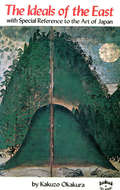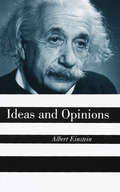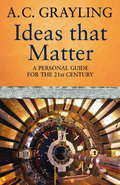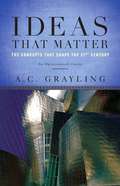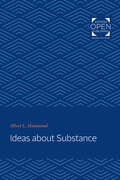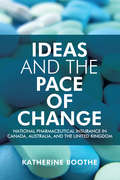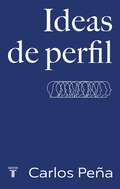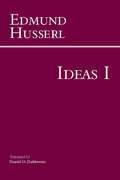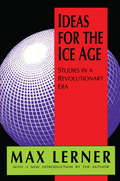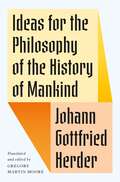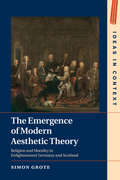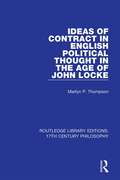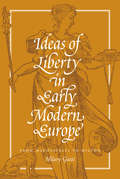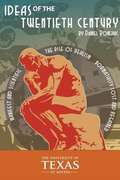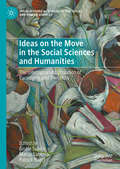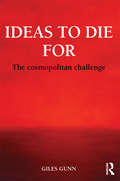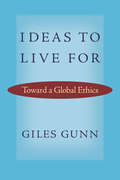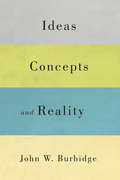- Table View
- List View
Ideals of the East: with Special Reference to the Art of Japan
by Kazuko OkakuraHere are the long-cherished ideals of the East with special reference to the ageless art of Japan. Japan, Okakura wrote more than 60 years ago, is a museum of Asiatic civilization, and yet more than a museum, because the singular genius of the race leads it to dwell on all phases of the ideals of the past, which welcomes the new without losing the old. He wrote of that broad expanse of love for the Ultimate and Universal, which is the common thought-inheritance of Asiatic races, enabling them to produce all the great religions of the world. In Buddhism he found "that great ocean of idealism, in which merge all the river-systems of Eastern Asiatic thought-not coloured only with the pure water of the Ganges, for the Tartaric nations that joined it made their genius also tributary, bringing new symbolism, new organization, new powers of devotion, to add to the treasures of the Faith." Asiatic art and culture went hand in hand, and how well Okakura wrote about both! He describes "That constant play of colours which distinguishes the religious and artistic life of the nation, . . . now gleaming in the amber twilight of idealistic Nara, now glowing with the crimson autumn of Fujiwara, again losing itself in the green sea waves of Kamakura, or shimmering in the silver moonshine of Ashikaga-returns upon ushere in all its glory, like the fresh verdure of a rain-swept summer." In writing of the national reawakening, Okakura worried about "that portentous danger with which Western encroachments on Asiatic soil threatened our national existence." This little classic undoubtedly reflects his concern-but it also is one of the best assurances that Japan will remain true to the Asiatic soul even while it nourishes as one of the industrial giants of the world.
Ideas And Opinions
by Albert EinsteinA new edition of the most definitive collection of Albert Einstein's popular writings, gathered under the supervision of Einstein himself. The selections range from his earliest days as a theoretical physicist to his death in 1955; from such subjects as relativity, nuclear war or peace, and religion and science, to human rights, economics, and government.From the Trade Paperback edition.
Ideas That Matter: A Personal Guide for the 21st Century
by A.C. GraylingLeading philosopher's guide to the ideas that will shape the 21st century'Ideas are the cogs that drive history, and understanding them is half way to being aboard that powerful juggernaut rather than under its wheels'. This is a book that celebrates the power of ideas: thought can, and does, change the world. And, in turn, ideas evolve. Fundamentalism, environmentalism and bioethics are defining our future just as Marxism, feminism or existentialism have influenced our present. So what do we need to know as we move into the 21st century? More than a simple reference work, this is A.C. Grayling's personal and heartfelt guide to the ideas, past and present, that shape our world. Covering religion, philosophy, scientific theory and political movements, each alphabetically ordered entry illuminates, elucidates and provokes. Written with Grayling's customary fire and erudition, the result is a book that aims both to arm readers with knowledge and engage them in philosophical debate.
Ideas That Matter: A Personal Guide for the 21st Century
by Prof A.C. GraylingLeading philosopher's guide to the ideas that will shape the 21st century'Ideas are the cogs that drive history, and understanding them is half way to being aboard that powerful juggernaut rather than under its wheels'. This is a book that celebrates the power of ideas: thought can, and does, change the world. And, in turn, ideas evolve. Fundamentalism, environmentalism and bioethics are defining our future just as Marxism, feminism or existentialism have influenced our present. So what do we need to know as we move into the 21st century? More than a simple reference work, this is A.C. Grayling's personal and heartfelt guide to the ideas, past and present, that shape our world. Covering religion, philosophy, scientific theory and political movements, each alphabetically ordered entry illuminates, elucidates and provokes. Written with Grayling's customary fire and erudition, the result is a book that aims both to arm readers with knowledge and engage them in philosophical debate.
Ideas That Matter: The Concepts That Shape the 21st Century
by A. C. GraylingIdeas can, and do, change the world. Just as Marxism, existentialism, and feminism shaped the last century, so fundamentalism, globalization, and bioethics are transforming our world now. In Ideas that Matter, renowned philosopher A. C. Grayling provides a personal dictionary of the ideas that will shape our world in the decades to come. With customary wit, fire, and erudition, Grayling ranges across the gamut of essential theories, movements, and philosophies--from animal rights to neurophilosophy to war crimes--provoking and elucidating throughout. Ideas are the cogs that drive history, and in explaining the most complex and influential ones in laymen’s terms, Ideas that Matter will help every engaged citizen better understand it.
Ideas about Substance (Seminar in the History of Ideas)
by Albert L. HammondOriginally published in 1969. Ideas about Substance is a part of the "Seminars in the History of Ideas" series at Johns Hopkins University Press.
Ideas and Opinions
by Albert EinsteinFrom one of the world's most important and enduring minds, Albert Einstein's ideas, thoughts, and philosophies on the world and its people. Copyright © Libri GmbH. All rights reserved.
Ideas and the Pace of Change
by Katherine BootheCanada is the only OECD country that has universal, comprehensive public hospital and medical insurance but lacks equivalent pharmaceutical coverage. In Ideas and the Pace of Change, Katherine Boothe explains the reasons for this unique situation. Using archival, interview, and polling data, Boothe compares the policy histories of Canada, the United Kingdom, and Australia in order to understand why Canada followed a different path on pharmaceutical insurance.Boothe argues that pace matters in policy change. Quick, radical change requires centralized political institutions, an elite consensus, and an engaged, attentive electorate. Without these prerequisites, states are far more likely to take a slower, incremental approach. But while rapid policy change reinforces the new consensus, incremental progress strengthens the status quo, letting development stall and raising the bar for achieving change.An important contribution to the study of comparative political economy, Ideas and the Pace of Change should be required reading for anyone seeking to understand why health care reforms succeed or fail.
Ideas de perfil
by Carlos PeñaUn deslumbrante repaso por la vida y obra de los más importantes pensadores contemporáneos. En este contundente libro Carlos Peña presenta un conjunto de perfiles que ahondan en las vidas y obras de los principales pensadores de la modernidad. Con claridad y distinción, el destacado ensayista chileno se pasea por las ideas de Maquiavelo, Kant, Freud, Sartre, De Beauvoir, Arendt, Kristeva, Heidegger, Wittgenstein, Zizek y una decena de filósofos, sociólogos, políticos y psicoanalistas. Utilizando el género del perfil para iluminar los claroscuros de las vidas y obras analizadas, Peña se presenta a los lectores en este nuevo libro como lector riguroso e incisivo, definiciones que han caracterizado su rol como intelectual público.
Ideas for a Pure Phenomenology and Phenomenological Philosophy: First Book: General Introduction to Pure Phenomenology (Hackett Classics)
by Edmund HusserlHusserl's Ideas is one of the most important works of twentieth-century philosophy, offering a detailed introduction to the phenomenological method, including the reduction, and outlining the overall scope of phenomenological philosophy. Husserl's explorations of the a priori structures of intentionality, consciousness, perceptual experience, evidence and rationality continue to challenge contemporary philosophy of mind. Dan Dahlstrom's accurate and faithful translation, written in pellucid prose and in a fluid, modern idiom, brings this classic work to life for a new generation. --Dermot Moran, University College, Dublin
Ideas for the Ice Age: Studies in a Revolutionary Era
by Max LernerIdeas for the Ice Age is a companion volume to Max Lerner's classic work Ideas Are Weapons. Both were written mostly in the 1930s, as products of a period when the democratic idea was under heavy siege from totalitarian ideologies of the right and left., In its focus, Ideas for the Ice Age is a study of the task of democracy in a revolutionary era, an enterprise that has taken on new urgency in the post-Communist world. For Lerner this task comprises four aspects around which the book is organized: the task of winning the future for American democracy, and planning its organization; the problem of selecting out those elements of a usable past which, when strengthened and extended, can assure a livable future; the problem of acting decisively in moments of international crisis; and the problem of strengthening democracy at home and completing its unfinished business., Within this framework, Lerner selects ideas and personalities that have decisively shaped the modern mind. The selections have lost none of their original timeliness. Among the wide range of figures considered here are Machiavelli, Franz Kafka, Randolph Bourne, Harold Laski, John Strachey. and Justice Oliver Wendell Holmes. Lerner reflects as well on the offices, institutions, and constitutional questions of American democracy in moments of historical crisis. For a new generation of readers, this gallery of thinkers will be essential reading, a must for students of American studies, the history of ideas, and political theory.
Ideas for the Philosophy of the History of Mankind
by Johann Gottfried HerderOne of the most important works of the Enlightenment—in the first new, unabridged English translation in more than two centuriesPublished in four volumes between 1784 and 1791, Herder’s Ideas for the Philosophy of the History of Mankind is one of the most important works of the Enlightenment—a bold, original, and encyclopedic synthesis of, and contribution to, the era’s philosophical debates over nature, history, culture, and the very meaning of human experience. This is the first new, unabridged English translation of the Ideas in more than two centuries. Gregory Martin Moore’s lively, modern English text, extensive introduction, and commentary bring this neglected masterpiece back to life.The Ideas—which engages with many of the leading thinkers of the eighteenth century, such as Montesquieu, Kant, Gibbon, Ferguson, Buffon, and Rousseau—is many things at once: an inquiry into the unity and purpose of history, a reflection on human nature and the place of humans in the cosmic order, an examination of what was beginning to be called “culture,” and a narrative of cultural progress across time among different peoples. Along the way, Herder considers a dizzying variety of topics, including the formation of the earth and solar system, species change, race, the immortality of the soul, the establishment of society, and the pursuit of happiness. Above all, the Ideas is an anthropology—what Alexander Pope had termed an “essay on man”—pervaded by an appropriately humane spirit.A fresh and much-needed modern translation of the complete Ideas, this volume reintroduces English readers to a classic of Enlightenment thought.
Ideas in Context: Ancient Wisdom in the Age of the New Science
by Dmitri LevitinSeventeenth-century England has long been heralded as the birthplace of a so-called 'new' philosophy. Yet what contemporaries might have understood by 'old' philosophy has been little appreciated. In this book Dmitri Levitin examines English attitudes to ancient philosophy in unprecedented depth, demonstrating the centrality of engagement with the history of philosophy to almost all educated persons, whether scholars, clerics, or philosophers themselves, and aligning English intellectual culture closely to that of continental Europe. Drawing on a vast array of sources, Levitin challenges the assumption that interest in ancient ideas was limited to out-of-date 'ancients' or was in some sense 'pre-enlightened'; indeed, much of the intellectual justification for the new philosophy came from re-writing its history. At the same time, the deep investment of English scholars in pioneering forms of late humanist erudition led them to develop some of the most innovative narratives of ancient philosophy in early modern Europe.
Ideas in Context: Enlightenment and Utility
by Emmanuelle De ChampsJeremy Bentham, the founder of classical utilitarianism, was a seminal figure in the history of modern political thought. This lively monograph presents the numerous French connections of an emblematic British thinker. Perhaps more than any other intellectual of his time, Bentham engaged with contemporary events and people in France, even writing in French in the 1780s. Placing Bentham's thought in the context of the French-language Enlightenment through to the post-Revolutionary era, Emmanuelle de Champs makes the case for a historical study of 'Global Bentham'. Examining previously unpublished sources, she traces the circulation of Bentham's letters, friends, manuscripts, and books in the French-speaking world. This study in transnational intellectual history reveals how utilitarianism, as a doctrine, was both the product of, and a contribution to, French-language political thought at a key time in European history. The debates surrounding utilitarianism in France cast new light on the making of modern Liberalism.
Ideas in Context: Italian Renaissance Humanism in the Mirror
by Patrick BakerThis important study takes a new approach to understanding Italian Renaissance humanism, based not on scholarly paradigms or philosophical concepts but on a neglected yet indispensable perspective: the humanists' understanding of themselves. Through a series of close textual studies, Patrick Baker excavates what humanists thought was important about humanism, how they viewed their own history, what goals they enunciated, what triumphs they celebrated - in short, he attempts to reconstruct humanist identity. What emerges is a small, coherent community dedicated primarily not to political ideology, a philosophy of man, an educational ethos, or moral improvement, but rather to the pursuit of classical Latin eloquence. Grasping the significance this stylistic ideal had for the humanists is essential to understanding both their sense of themselves and the importance they and others attached to their movement. For eloquence was no mere aesthetic affair but rather appeared to them as the guarantor of civilisation itself.
Ideas in Context: Religion and Morality in Enlightenment Germany and Scotland (Ideas in Context)
by Simon GroteBroad in its geographic scope and yet grounded in original archival research, this book situates the inception of modern aesthetic theory - the philosophical analysis of art and beauty - in theological contexts that are crucial to explaining why it arose. Simon Grote presents seminal aesthetic theories of the German and Scottish Enlightenments as outgrowths of a quintessentially Enlightenment project: the search for a natural 'foundation of morality' and a means of helping naturally self-interested human beings transcend their own self-interest. This conclusion represents an important alternative to the standard history of aesthetics as a series of preludes to the achievements of Immanuel Kant, as well as a reinterpretation of several canonical figures in the German and Scottish Enlightenments. It also offers a foundation for a transnational history of the Enlightenment without the French philosophes at its centre, while solidly endorsing historians' growing reluctance to call the Enlightenment a secularising movement.
Ideas in Context: The Crisis of German Historicism
by Liisi KeedusHannah Arendt and Leo Strauss - two major political thinkers of the twentieth century, both of German-Jewish background and forced into exile in America - were never friends or intellectual interlocutors. Yet they shared a radical critique of contemporary idioms of politically oriented discourses and a lifelong effort to modify reflective approaches to political experience. Liisi Keedus reveals how Arendt's and Strauss's thinking about political modernity was the product of a common intellectual formation in Weimar Germany, by examining the cross-disciplinary debates guiding their early work. Through a historical reconstruction of their shared interrogative horizons - comprising questions regarding the possibility of an ethically engaged political philosophy after two world wars, the political fate of Jewry, the implications of modern conceptions of freedom, and the relation between theoria and praxis - Keedus unravels striking similarities, as well as genuine antagonisms, between the two thinkers.
Ideas of Contract in English Political Thought in the Age of John Locke (Routledge Library Editions: 17th Century Philosophy)
by Martyn P. ThompsonOriginally published in 1987. This book analyses what Englishmen understood by the term contract in political discussions during the late seventeenth and early eighteenth centuries. It provides evidence for reconsidering conventional accounts of the relationships between political ideas, groups and practices of the period. But also suggests cause for examining the general history of modern European contract theory. It considers contract as a term appearing in a spectrum of works from philosophical treatise to sermons and polemical pamphlets. Looking at the various vocabularies relating to contractualist ideas, the author suggests that standard histories of social contract theory and particular histories of English political thought during this unstable period have misrepresented the meaning of the term contract as a key term in political argument. He shows that there were in fact three different categories of contract theory but allows that the various kinds of contractualism did share certain broad features. This study of a crucial age in the history of appeals to contract in political argument will be of interest to political philosophers and historians.
Ideas of Liberty in Early Modern Europe
by Hilary GattiEurope's long sixteenth century--a period spanning the years roughly from the voyages of Columbus in the 1490s to the English Civil War in the 1640s--was an era of power struggles between avaricious and unscrupulous princes, inquisitions and torture chambers, and religious differences of ever more violent fervor. Ideas of Liberty in Early Modern Europe argues that this turbulent age also laid the conceptual foundations of our modern ideas about liberty, justice, and democracy.Hilary Gatti shows how these ideas emerged in response to the often-violent entrenchment of monarchical power and the fragmentation of religious authority, against the backdrop of the westward advance of Islam and the discovery of the New World. She looks at Machiavelli's defense of republican political liberty, and traces how liberty became intertwined with free will and religious pluralism in the writings of Luther, Erasmus, Jean Bodin, and Giordano Bruno. She examines how the St. Bartholomew's Day Massacre and the clash of science and religion gave rise to concepts of liberty as freedom of thought and expression. Returning to Machiavelli and moving on to Jacques Auguste de Thou, Paolo Sarpi, and Milton, Gatti delves into debates about the roles of parliamentary government and a free press in guaranteeing liberties.Drawing on a breadth of canonical and lesser-known writings, Ideas of Liberty in Early Modern Europe reveals how an era stricken by war and injustice gave birth to a more enlightened world.
Ideas of Power in the Late Middle Ages, 1296–1417
by Joseph CanningThrough a focused and systematic examination of late medieval scholastic writers - theologians, philosophers and jurists - Joseph Canning explores how ideas about power and legitimate authority were developed over the 'long fourteenth century'. The author provides a new model for understanding late medieval political thought, taking full account of the intensive engagement with political reality characteristic of writers in this period. He argues that they used Aristotelian and Augustinian ideas to develop radically new approaches to power and authority, especially in response to political and religious crises. The book examines the disputes between King Philip IV of France and Pope Boniface VIII and draws upon the writings of Dante Alighieri, Marsilius of Padua, William of Ockham, Bartolus, Baldus and John Wyclif to demonstrate the variety of forms of discourse used in the period. It focuses on the most fundamental problem in the history of political thought - where does legitimate authority lie?
Ideas of the Twentieth Century
by Daniel BonevacThe twentieth century ushered in significant progress, as philosophers, scientists, artists, and poets across the world improved the way we lived. Yet the last century also brought increased levels of war, tyranny, and genocide, and people lost faith in values. Now, thinkers and leaders are reconstructing theories of value and creating institutions to embody them. In this thought-provoking, broad-sweeping course, you will learn how philosophy, art, literature, and history shaped the past century and continue to impact our world today.
Ideas on the Move in the Social Sciences and Humanities: The International Circulation of Paradigms and Theorists (Socio-Historical Studies of the Social and Human Sciences)
by Gisèle Sapiro Patrick Baert Marco SantoroThis edited collection analyses the reception of a selection of key thinkers, and the dissemination of paradigms, theories and controversies across the social sciences and humanities since 1945. It draws on data collected from textbooks, curricula, interviews, archives, and references in scientific journals, from a broad range of countries and disciplines to provide an international and comparative perspective that will shed fresh light on the circulation of ideas in the social and human sciences. The contributions cover high-profile disputes on methodology, epistemology, and research practices, and the international reception of theorists that have abiding and interdisciplinary relevance, such as: Antonio Gramsci, Hannah Arendt, Karl Polanyi, Pierre Bourdieu, Michel Foucault, Edward Said and Gayatri Spivak. This important work will be a valuable resource to scholars of the history of ideas and the philosophy of the social sciences; in addition to researchers in the fields of social, cultural and literary theory.
Ideas to Die For: The Cosmopolitan Challenge
by Giles GunnCosmopolitanism and Its Discontents seeks to address the kinds of challenges that cosmopolitan perspectives and practices face in a world organized increasingly in relation to a proliferating series of global absolutisms – religious, political, social, and economic. While these challenges are often used to support the claim that cosmopolitanism is impotent to resist such totalizing ideologies because it is either a Western conceit or a globalist fiction, Gunn argues that cosmopolitanism is neither. Situating his discussion in an emphatically global context, Gunn shows how cosmopolitanism has been effective in resisting such essentialisms and authoritarianisms precisely because it is more pragmatic than prescriptive, more self-critical than self-interested and finds several of its foremost recent expressions in the work of an Indian philosopher, a Palestinian writer, and South African story-tellers. This kind of cosmopolitanism offers a genuine ethical alternative to the politics of dogmatism and extremism because it is grounded on a new delineation of the human and opens toward a new, indeed, an "other," humanism.
Ideas to Live For: Toward a Global Ethics (Studies in Religion and Culture)
by Giles B. GunnOver the course of his distinguished interdisciplinary career, Giles Gunn has sustained his focus on the continuing threats to our collective sense of the human that seem to result from the link between the collision of fundamental values and the increase of systemic violence. He asks whether such threats can be at least mitigated, even if not removed, by understanding as opposed to force and what resources a more pragmatic cosmopolitanism might provide for doing so. How, in other words, might our sense of the human be reconstructed, not around suspicion or antipathy toward others, but around an epistemological and moral need of them? In this narrativized collection of his essays, Gunn introduces each one with a set of comments designed to explain his goal when first writing them and what they mean to him now. The variety of issues he addresses ranges from the theory of culture and cultural criticism (particularly in America), the philosophy of inter- and cross-disciplinary studies, and the psychology and politics of pragmatism to the ethics of human solidarity, the place of culture in the misshaping of international affairs, and the quest of both religion and culture for a new basis for the normative.
Ideas, Concepts, and Reality
by John W. BurbidgeDo concepts exist independently of the mind? Where does objective reality diverge from subjective experience? John Burbidge calls upon the work of some of the foremost thinkers in philosophy to address these questions, developing a nuanced account of the relationship between the mind and the external world. In Ideas, Concepts, and Reality John Burbidge adopts, as a starting point, Gottlob Frege's distinction between "ideas," which are subjective recollections of past sensations, and "concepts," which are shared by many and make communication possible. Engaging with Aristotle, Descartes, Kant, Hegel, and many others, the book argues that concepts are not eternal and unchanging, as Frege suggested, but open to revision. We can move from ideas to thoughts, Burbidge suggests, that can be refined to the point where they acquire independent and objective status as concepts. At the same time, they are radically connected to other concepts which either complement or are differentiated from them. Ideas, Concepts, and Reality offers a fresh perspective on the ways in which rigorous thought differs from other operations of the mind. Daringly inventive and accessibly written, the book will appeal to philosophers at all levels of interest.
